Excerpt from Feb PUF 2.0 – Electrification 2018

Ryan Popple, CEO of Electric Bus Manufacturer Proterra, on the Electrification Revolution:
“Since a diesel bus is in a stop-start urban application, that engine is revving up, and cooling down, and stopping, and starting, five hundred times a day. Bus engines, transmissions, and brakes get worn out much faster than trucks.
You've got vested interests in this industry that know when we change over to EV, their whole business model doesn't work anymore. They fit the classic razor — razorblade model. They're basically selling cities a product that comes with a lifetime of spare parts that are going to be required.
To put some numbers around it, the average city diesel bus is around five hundred thousand dollars fully configured. We estimate that a typical diesel customer is going to need to buy four hundred thousand dollars of spare parts and repairs over a twelve-year life.
With EV, you're reducing that by at least fifty percent. In many cases, it could be more.
To make one final point on that as an example, we've had Proterra buses on the road now for several years, and we've accumulated over four million service miles in a variety of climates. Because our vehicle can slow itself down by regenerating power through the motor, there is much less wear and tear on the brake systems. There's not a single Proterra customer that has had to repair or replace their vehicle braking systems because of that EV technology. We haven't had to do a brake replacement yet…
I think the awareness has really broken through in the city transit sector. On the school bus side, which is the next market I think the technology will enter, we're still at a very early phase of awareness.
In terms of the city bus market though, we're seeing multiple cities and now states starting to contemplate one hundred percent EV transit implementation plans. The important thing for them is simply depreciating and destroying or discarding their old buses.
If we wanted this to go even faster, I think we would need to have a cash for clunkers program for buses, so cities could take buses off the road faster. The only thing that holds us back is that a transit bus typically has a twelve-year asset life. The transit buses that are purchased in 2018 that are diesel, are going to be on the road until 2030…
The main thing is just education, but the good news is we're shipping buses to multiple cities every month. As people experience them, and the operators experience them, they learn that actually these vehicles are better in every metric than a diesel bus.
They're quieter, faster, can climb more hills, and have more interior space. That makes sense because diesel buses are old technology and haven’t fundamentally changed in decades…
By 2030 if a single diesel bus or natural gas bus is sold in any major city in the world, I would be disappointed in our industry and its inability to bring positive change in this society.
It already makes economic and environmental sense to implement electric buses, so by 2030 I would predict that, from economic, environmental, and from a regulatory perspective there will be no new sales at all of city transit buses or school buses that are anything other than zero emission.”
Read the complete article here.
For ninety years, since 1928, Public Utilities Fortnightly has served as the platform for thought leaders to impact the debate in utility regulation and policy. Join the debate. Have your organization join the debate, as a member of the PUF community.
Steve Mitnick, Editor-in-Chief, Public Utilities Fortnightly
E-mail me: mitnick@fortnightly.com


